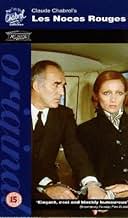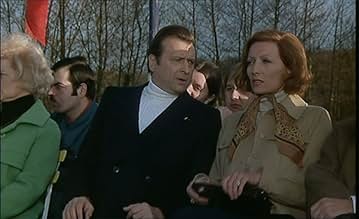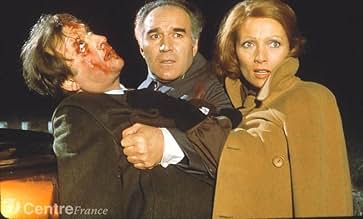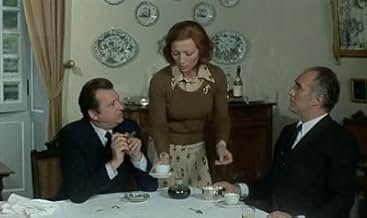Les noces rouges
- 1973
- Tous publics
- 1h 35min
NOTE IMDb
6,9/10
2,2 k
MA NOTE
Ajouter une intrigue dans votre langueIn a small French town, the mayor discovers his wife is cheating on him, a betrayal that eventually leads to murder.In a small French town, the mayor discovers his wife is cheating on him, a betrayal that eventually leads to murder.In a small French town, the mayor discovers his wife is cheating on him, a betrayal that eventually leads to murder.
- Réalisation
- Scénario
- Casting principal
- Récompenses
- 1 victoire et 1 nomination au total
Avis à la une
Behind every film there lies a story which is certainly true of this one as Michel Piccoli as Pierre and Stéphane Audran as Lucienne are based upon Bernard and Yvette, the 'diabolical lovers' of Bourganeuf. Indeed the film's release had to be postponed so as not to coincide with the murder trial.
Although lacking the stylistic brilliance of some of Chabrol's other works in this genre, it's construction, precision and refinement are those of a director eminently secure in his material.
Here Valencay stands in for Bourganeuf and becomes an unflattering portrait of provincial France. Its mean-spirited and hypocritical denizens thrive on prurient gossip which motivates Pierre and Lucienne, aware of their bourgeois social status, to become secret murderers rather than public adulterers.
What is most striking about the film is the gradual darkening of tone, not least when Claude Piéplu as the pompous husband ceases to be a figure of fun and shows his true colours and whose brutal demise is brilliantly realised. The downbeat ending with the final shot of the couple's shackled hands is most effective whilst Pierre Jansen's score is well integrated.
The opening quotation from the third part of the 'Oresteia' of Aeschylus leads us to believe that the film will deal with moral complexity but in reality one can feel no sympathy at all for Pierre and Lucienne for had they not been so obsessed with appearances they could have simply left their troublesome partners rather than bumping them off. The overriding emotion, for this viewer at any rate, is one of pity, for like so many literary/cinematic couples who have done away with inconvenient spouses, the initial feeling of 'freedom' is an illusion as they have merely swapped one kind of entrapment for another.
Although lacking the stylistic brilliance of some of Chabrol's other works in this genre, it's construction, precision and refinement are those of a director eminently secure in his material.
Here Valencay stands in for Bourganeuf and becomes an unflattering portrait of provincial France. Its mean-spirited and hypocritical denizens thrive on prurient gossip which motivates Pierre and Lucienne, aware of their bourgeois social status, to become secret murderers rather than public adulterers.
What is most striking about the film is the gradual darkening of tone, not least when Claude Piéplu as the pompous husband ceases to be a figure of fun and shows his true colours and whose brutal demise is brilliantly realised. The downbeat ending with the final shot of the couple's shackled hands is most effective whilst Pierre Jansen's score is well integrated.
The opening quotation from the third part of the 'Oresteia' of Aeschylus leads us to believe that the film will deal with moral complexity but in reality one can feel no sympathy at all for Pierre and Lucienne for had they not been so obsessed with appearances they could have simply left their troublesome partners rather than bumping them off. The overriding emotion, for this viewer at any rate, is one of pity, for like so many literary/cinematic couples who have done away with inconvenient spouses, the initial feeling of 'freedom' is an illusion as they have merely swapped one kind of entrapment for another.
Les noces rouges is, first, just a correct film. You recognize Claude Chabrol in each scene , and the performances of Stephane Audran, Claude Pieplu , Michel Piccoli is one of fundamental marks. It is not the film to convince - the love affair between Lucinne and Pierre is only conventional, the effort of Pieplu reminds the steps of many politicians,Eliana de Santis gives her the best , in minimalism frame, reminding the rafinated cruelty of childhood, Clotilde Joao seems perfect in the shadow of the character of Clotilde Maury.Like many films of Chabrol, Red Wedding gives not exactly a story but the precious lavor of melancholy.
Under the surface of middle class boredom and entrapment, love for the forbidden and unattainable drives two respectable, kind people to murder. It isn't realistic, yet feels real, as does the daughter's unconscious urge to destroy her beloved mother. The murder victims are at once pitiable and richly deserve their ends. The performances are great all round.
By no means one of Chabrol's finest this is nevertheless most watchable and the most agreeable and sinister soundtrack always suggests this may become something much grander. As it is it is a fairly predictable tale with the odd twist but leaves the two leads/lovers ending up looking rather stupid. I'm sure Mr Chabrol, like his mentor, Hitchcock found himself a little less than at ease with the ladies. Hence his wife Stephane Audran and Michel Piccoli, two great actors, but who it has to be said, are both so seemingly lacking in passion, are asked to convince that they would gladly rush to a riverbank or rooms within a stately home to make wild, passionate love. I don't think so! Claude Pieplu is great fun as the at first pompous and later calculating cuckold husband and although we are assured he is not 'up to the job' he seems to have far more fire in him than the other two. Certainly worth watching this is a curious example of the director's work and just goes to show that, again like Hitchcock, even his lesser films are at least interesting, if a little awkward.
I was very surprised upon reading some of the comments for this film after having seen it - not only is this not a lesser Chabrol movie or a non-entertaining one, for my money its Chabrol at his subtle and intriguing best, and no doubt up there with the likes of The Unfaithful Wife and Le Boucher! The plot is not particularly original, but it's not too important as it's Chabrol's style and attention to detail that really makes the film what it is anyway. The plot seems to take a lot of influence from the classic 'The Postman Always Rings Twice' and focuses on murder due to an illicit love affair. Lucienne Delamare is not so happily married to town major Paul Delamare and, unbeknown to her husband, is currently engaged in an affair with her husband's assistant Pierre Maury. The two are able to spend time together because Paul is often away on business. Pierre's wife Clotilde is weak and sick and when she dies suddenly, the town suspect suicide; but the truth is more sinister, as revealed by Pierre's confession to Lucienne...
The film is kept interesting as Chabrol always focuses on the important elements and ensures that the chemistry between the leads is always engaging. The acting is once again superb with Chabrol's beautiful wife (at the time) Stéphane Audran being suitably brooding and mysterious in the lead role and receiving excellent support from Michel Piccoli and Claude Piéplu. The village in which the film takes place is also well thought out and Chabrol manages to create a foreboding atmosphere stemming from that. As usual with Chabrol films, this one is beautifully shot and realised and it's clear that the director put a lot of care and attention into the film. As usual, the suspense is generated through intrigue and the way that the characters are developed rather than through scenes of tension, though there are some brilliant sequences in the film - a pivotal scene towards the end involving a car accident being particularly noteworthy. I wouldn't recommend this film as a starting point for someone who has not previously seen a Claude Chabrol film, but I'd be surprised if fans of his don't enjoy it. Highly recommended!
The film is kept interesting as Chabrol always focuses on the important elements and ensures that the chemistry between the leads is always engaging. The acting is once again superb with Chabrol's beautiful wife (at the time) Stéphane Audran being suitably brooding and mysterious in the lead role and receiving excellent support from Michel Piccoli and Claude Piéplu. The village in which the film takes place is also well thought out and Chabrol manages to create a foreboding atmosphere stemming from that. As usual with Chabrol films, this one is beautifully shot and realised and it's clear that the director put a lot of care and attention into the film. As usual, the suspense is generated through intrigue and the way that the characters are developed rather than through scenes of tension, though there are some brilliant sequences in the film - a pivotal scene towards the end involving a car accident being particularly noteworthy. I wouldn't recommend this film as a starting point for someone who has not previously seen a Claude Chabrol film, but I'd be surprised if fans of his don't enjoy it. Highly recommended!
Le saviez-vous
- ConnexionsFeatured in La cérémonie (1995)
Meilleurs choix
Connectez-vous pour évaluer et suivre la liste de favoris afin de recevoir des recommandations personnalisées
- How long is Wedding in Blood?Alimenté par Alexa
Détails
- Date de sortie
- Pays d’origine
- Langue
- Aussi connu sous le nom de
- Wedding in Blood
- Lieux de tournage
- Valençay, Indre, France(main location: street scenes, cemetery, Maury's apartment 31 Rue de la République)
- Sociétés de production
- Voir plus de crédits d'entreprise sur IMDbPro
- Durée1 heure 35 minutes
- Mixage
- Rapport de forme
- 1.66 : 1
Contribuer à cette page
Suggérer une modification ou ajouter du contenu manquant

Lacune principale
By what name was Les noces rouges (1973) officially released in Canada in English?
Répondre
























